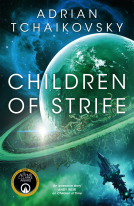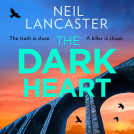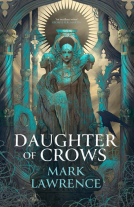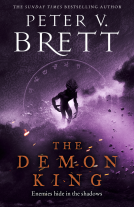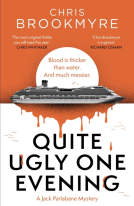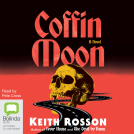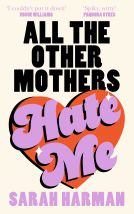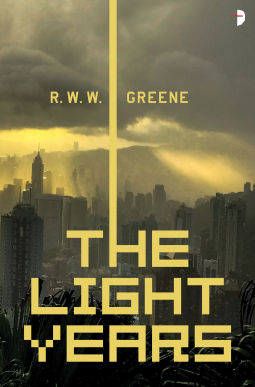
The Light Years
by R.W.W. Greene
This title was previously available on NetGalley and is now archived.
Send NetGalley books directly to your Kindle or Kindle app
1
To read on a Kindle or Kindle app, please add kindle@netgalley.com as an approved email address to receive files in your Amazon account. Click here for step-by-step instructions.
2
Also find your Kindle email address within your Amazon account, and enter it here.
Pub Date 11 Feb 2020 | Archive Date 14 Jan 2020
Talking about this book? Use #TheLightYears #NetGalley. More hashtag tips!
Description
Hisako Saski was born with her life already mapped out. In exchange for an education, better housing for her family, and a boost out of poverty, she’s been contracted into an arranged marriage to Adem Sadiq, a maintenance engineer and amateur musician who works and lives aboard his family's sub-light freighter, the Hajj.
Hisako is not happy with the deal. The arcane branch of physics it requires her to study broke off a thousand years before, and she is not keen on the idea of giving up everything she knows to marry a stranger and move onto an aging spaceship.
Onboard the Hajj, Hisako soon learns her dilemmas are overshadowed by the discovery of ancient secrets, a derelict warship, and a chance at giving the survivors of Earth a fresh start.
File Under: Science Fiction [ E=mc2 | Happy wife, Happy life | Marital Bliss | Light Years Away ]
Available Editions
| EDITION | Other Format |
| ISBN | 9780857668363 |
| PRICE | $14.99 (USD) |
| PAGES | 400 |
Links
Average rating from 26 members
Featured Reviews
 Paul S, Reviewer
Paul S, Reviewer
A really interesting premise that is well crafted, well told and a pleasure to read, I admit the story was not one I would have initially been drawn to but I am very grateful for being given the opportunity to read this book, highly recommended
This was a good read.
Merchants ply their trades throughout the galaxy and when they come back to their planet, they have only aged the length of their voyage but planet side, people age in years or decades.
Traders are referred to as immortals and make long range plans including contracting for marriages to assist their businesses - here a marriage contract requires the future bride to study specific topics that will benefit the owners of a merchant ship. Ancient technology is scattered throughout the universe (a warp drive built by the Americas) and obtaining this technology can lead to nefarious plots.
Great and very interesting world building - I can't wait to see more. The characters are well written and relationships between characters are also very strong.
However, there was not much plot to the story and it seems like this book is laying the groundwork for things to come, which appears to be promising.
 Reviewer 194793
Reviewer 194793
The Light Years premise really intrigued me. Told in alternative chapters and timelines set way into the future, you’d be forgiven for getting a bit confused. I enjoyed The Light Years, but some of the space tech stuff was hard to follow. Definitely an interesting, speculative read.
This was the kind of novel that I always hope to stumble across - fantastic world-building with just enough fiction blended in to make the SF aspirational-esque, vivid and enthralling characters who have their own motivations and voices, and a plot line with enough bends to keep you interested in continuing the story to the end. You can tell the author has some understanding of both music and politics, and is writing to his strengths. Greene does a great job building the characters during their changes in relative time, taking the effort to build their layers and growth step by step. The best thing I can say is that when I finished The Light Years, I immediately hoped there would be a sequel. If there is not, I will definitely keep my eyes out for anything else Greene does in the future.
 Ernest L, Media/Journalist
Ernest L, Media/Journalist
The Light Years is a wonderful debut novel from a talented writer making the transition from short stories to a longer form. It's excellent space opera with a family-owned slower than light ship making its run between post-diaspora worlds which experience decades for every year of the trader's transit. THere's a touch of Heinlein's Citizen of the Galaxy in here, as well as a lot of very original thought.
At the outset, Adem, the son of the ship captain, goes planetside to arrange for a wife. He won't take delivery until the ship's next visit more than two decades away, and his mother the captain has very specific requirements for the still-nascent bride, specifically near-genius aptitudes in math and physics. Fortunately, that can be genetically tweaked into her, and hopefully by the time they return the child, Hisako, will have matured into a tool the captain can user for her plans. Arranged marriages have always been about the families more than the principles, and the story follows both Hisako and Asem as she grows up to be a strong and independent woman and he processes the future in his accelerated time frame.
The future, as William Gibson has pointed out, is not evenly distributed. While the Haaj and her sister ships travel at speeds approaching c, a few ships were built with worm-hole technology, though the knowledge needed to make those drive was lost to war and cataclysm. The few remaining ships are rare and precious, properties of governments who dare not use them. But the captain of the Haaj has a plan that might just let her ship get its hands on one
I can't say enough good things about this book. It's rich in cultural details, full of great characters, internal conflicts, and family drama, and enough explosions and betrayals to keep it all lively.
Highly recommended.
 Maryam P, Reviewer
Maryam P, Reviewer
Set in a future where humankind left a dying Earth to reach the stars, The Light Years follows Hisako Saski and Adem Sadiq, two people forced to marry to fulfill the wishes of their respective families.
The Sadiq own The Haji, a sub-light ship used to carry goods between planet. While this ship is very valuable, it’s getting old and the family cannot afford to lose it. The captain has a plan to transform it by using the remains of a warship powered by a lost technology. To do so, she needs the help of a physic scientist well-versed in the subject.
Hasiko Saski’s parents decided she was going to marry into the Sadiq family before she was born. This alliance is the only way for her to have a good education and a relative peaceful life on Freedom, a planet that is slowly yet surely succumbing to a civil war.
Hisako learns about the arranged marriage as a child and she’s definitely not pleased about it. Especially because one of the requirements is that she must obtain a PhD in United America- a long lost civilization- physics.
I didn’t expect this book to be what it was. With the synopsis, I thought it was going to be a kind of enemies to lovers’ space romance with a bit of political maneuvering thrown into the mix. It wasn’t, but it doesn’t mean I didn’t enjoy the story. On the contrary, I was pleasantly surprised to read a fascinating story following two protagonists trying to live their best life in a world that is falling apart.
The worldbuilding was wonderful. Basically, in this future, if you’re not wealthy enough, you cannot have children. If you still decide to have children, you have to either abandon them in the street, indenture yourself to buy the right to keep them or, legally bind them to a company or a family.
In the case of Hisako, a marriage contract was the only solution for her parents to provide her with a good life – food, a home outside of the refugee camp of Freedom and education. The only requirement of the contract was that she spent 2 years working on the ship.
This book follows each character and we get to see how they experience time and life very differently. The story starts with Adem visiting Freedom to sign the marriage contract when Hisako isn’t even born. He then returns on the Haji to continue his work on the trade ship. The Haji is traveling almost at the speed of light so while he is traveling from planet to planet, his relative time is not moving at the same rate as Hisako’s. Which means that for the first part of the book, we follow Hisako’s first 24 years of life, which represents only a couple of months for Adem.
It created a very interesting dynamic: the two characters have very different approaches to the arranged marriage and we get to see how they deal with it in their own way and for different lengths of time.
I also really enjoying discovering the reasons for this unlikely alliance and how business-like it was for Adem’s family. At the same time, I feel like I wanted the two characters to get along because I could feel like I knew them so well. However, I could definitely understand the frustration each party had for one another, especially when they first meet.
I just have to reiterate that this is not a romance story, I think the blurb is pretty misleading, it’s not lying per say but if you decided to pick up the book because of that, you might feel deprived from what you wanted. I didn’t mind because this book had a lot of elements that I found fascinating. It was however, definitely slow and character-driven. The plot is not groundbreaking and not a lot of things happen.
I didn’t find it boring at all because I had way too much fun learning about the world and the characters but I think it’s worth mentioning. For me, it shares a lot of similar traits to A Long Way to a Small, Angry Planet by Becky Chambers. To be honest, I actually liked this more than Chambers’s works because the structure and the themes explored in this book were more interesting to me.
If you are looking for a quiet science fiction story with two interesting characters who are just two good human beings trying their best, I would definitely recommend The Light Years. I hope Greene will write other books or stories set in this world because I will be reading them.
Four stars.
I received a copy of this book from Netgalley in exchange for an honest review. My thanks to Angry Robot. All opinions are my own.
Published by Angry Robot on February 11, 2020
The Light Years builds on a science fiction premise I haven’t seen before. Most elements of the future that R.W.W. Greene imagines are familiar. Traders roam through the galaxy at relativistic speeds, returning home having aged less (relatively speaking) than the family members they left behind. The traders belong to a guild. Investors purchase shares in trading ships, taking a proportionate share of profits that the ship generates. The ships are family-operated, more or less.
Earth is a memory, most of its inhabitants having been incinerated by a solar event. The United Americas evacuated people on a dozen worm-drive ships and a bunch of ships that could not travel faster than light. Other groups of nations joined the evacuation. After the Caliphate and the United Americas settled their respective worlds, they destroyed each other in a war that lasted two days.
Here’s the new wrinkle to that background. Given the nature of relativity, it isn’t productive for a trader to begin a romance, go on a six-month voyage, and return to a lover who has aged fifty years. Traders therefore contract an arranged marriage, usually by bribing a family to donate a spouse in exchange for enough cash to live a better life.
Adem Sadiq is an engineer on the Hajj. His family arranges his marriage with Hisako Saski. They fund her education in physics, with a specialization that might help her understand wormhole drives, a technology that was lost when the UA was destroyed. The arrangement assures that Hisako and her parents will have a better life while bringing fresh blood to the crew of the Hajj. Adem’s only concern is that his new wife won’t want him to sleep with a crew member named Sarat, a pastime he enjoys.
Some of the story revolves around the relationship between Adem and Hisako, which for a long time is platonic, despite their shared interest in music. Adem is a nice guy and Hisako resents being sold into something resembling bondage, a situation that doesn’t lend itself to connubial bliss. That’s an interesting concept, although Greene could have done more with it.
The bulk of the story concerns a salvage operation that the Hajj undertakes. A badly damaged UA ship might yield a treasure trove of lost technology, including both a wormhole drive and the world-destroying weapon that ended the Two Day War. An investor/uncle named Rakin would like to sell the tech while a minority of family members think life-improving knowledge should be given away for the benefit of humanity, although only after instructions for building the world-destroying weapon are wiped from the memory banks. That conflict provides most the tension that develops in the novel’s later stages.
Whether Adem and Hisako will bond is a question that will interest readers who favor romance themes. Since the romantic plot thread never devolves into cheesiness, it contributes something to the story, although the contribution has little impact. Greene does raise philosophical questions about what it means to be happy, questions of a highly individualistic nature to which there are no easy answers. The exploration of those questions isn’t profound, but at least Greene makes an attempt to give a reader something to chew on.
The larger plot, involving the conflict over the salvaged technology, leads to an unexciting resolution. In fact, the plot generally fizzles out after a strong beginning. As a debut novel, however, The Light Years shows promise. With either greater depth or enough action to excite, the novel could have been exceptional. As it stands, it works well enough to earn a mild recommendation but not well enough to suggest it be placed near the top of a science fiction fan’s reading list.
RECOMMENDED
Readers who liked this book also liked:
M. K. Oliver
General Fiction (Adult), Humor, Mystery & Thrillers
Sarah Harman
General Fiction (Adult), Mystery & Thrillers, Women's Fiction
